|
|
|
Sort Order |
|
|
|
Items / Page
|
|
|
|
|
|
|
| Srl | Item |
| 1 |
ID:
075386
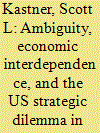

|
|
|
|
|
| Publication |
2006.
|
| Summary/Abstract |
As tensions across the Taiwan Strait have risen in recent years, some have argued that the US policy of strategic ambiguity-under which Washington leaves unclear if and how it would intervene in a cross-Strait conflict-has outlived its usefulness because ambiguity may foster dangerous misperceptions about US intentions and hence contribute to future crises. In this essay I critically examine strategic ambiguity, and conclude that ambiguity remains the best policy available to Washington given current US goals in the Taiwan Strait. I argue that ambiguity remains essential both to deterring a Chinese attack and to restraining Taiwanese moves toward independence, but that it nonetheless carries with it inherent risks of conflict. I further argue, however, that these additional risks triggered by ambiguity per se are likely small, and hence are overshadowed by the strategic obstacles faced by the alternatives to an ambiguous policy. Moreover, I show that growing economic interdependence between Mainland China and Taiwan further reduces the risk that ambiguity itself would be a contributing factor to war in the Taiwan Strait. As such, the relative attractiveness of ambiguity has likely increased, rather than decreased as argued by its critics, over the past decade.
|
|
|
|
|
|
|
|
|
|
|
|
|
|
|
|
| 2 |
ID:
087293
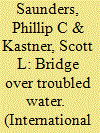

|
|
|
|
|
| Publication |
2009.
|
| Summary/Abstract |
In Taiwan's 2008 presidential election, both candidates advocated signing a peace agreement with China, and Chinese leaders have also expressed interest in reaching such an agreement. Although substantial obstacles remain in the way of a cross-strait peace agreement, this increased interest on both sides of the Taiwan Strait suggests that a closer examination of an agreement's possible dimensions and consequences is warranted. This analysis considers what an agreement might look like, whether and how it might be effective in reducing the possibility of cross-strait military conflict, the relevant barriers to an agreement, and whether an agreement-if reached-would be likely to endure.
|
|
|
|
|
|
|
|
|
|
|
|
|
|
|
|
| 3 |
ID:
075475
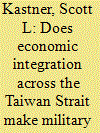

|
|
|
|
|
| Publication |
2006.
|
| Summary/Abstract |
Deepening economic ties across the Taiwan Strait are widely believed by analysts and scholars to be a stabilizing force in cross-Strait political relations. Yet within the broader international relations literature, the relationship between economic interdependence and military conflict continues to be controversial. This article examines the impact of growing cross-Strait economic links on the likelihood of cross-Strait military conflict within the context of this broader literature. A description of three separate causal mechanisms-identified in the existing literature-through which economic ties could promote peace, is followed by a discussion of how widely these processes are operating in the Taiwan Strait case Although the article does not rule out the possibility that economic integration across the Strait makes a military confrontation less likely, it shows that the evidence in support of such a proposition is ambiguous.
|
|
|
|
|
|
|
|
|
|
|
|
|
|
|
|
| 4 |
ID:
106724
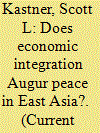

|
|
|
|
|
| Publication |
2011.
|
| Summary/Abstract |
At the end of the day, it is not clear that economic ties will act as a significant constraint on state behavior when high-stakes issues are on the table.
|
|
|
|
|
|
|
|
|
|
|
|
|
|
|
|
| 5 |
ID:
147906
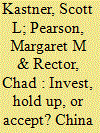

|
|
|
|
|
| Summary/Abstract |
China has played an inconsistent role in multilateral governance, sometimes contributing to the creation and maintenance of international regimes, sometimes free riding or even threatening to undermine multilateral regimes to improve its position. We show that the strategic context of a particular issue of international concern affects China's approach to multilateralism and argue that our approach adds additional leverage to existing theories that rely on assumptions about its inherent disposition or socialization processes. An emerging global power will be willing to invest more in supporting a regime when its outside options are relatively poor. When its outside options are good, it will free ride on the efforts of more established states if it is not a necessary player in maintaining regimes, and if it is seen as indispensable it will threaten to hold up regime support as a way to win concessions. We show that these two factors, outside options and indispensability, can help explain changes in China's strategy with respect to the issue of North Korea's nuclear program and the regulation of international finance.
|
|
|
|
|
|
|
|
|
|
|
|
|
|
|
|
| 6 |
ID:
111747
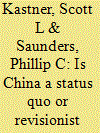

|
|
|
|
|
| Publication |
2012.
|
| Summary/Abstract |
China's rising power and increased global activism have attracted increasing attention, with particular focus on whether a stronger China is likely to be a revisionist or status quo state. Power transition theory highlights the potential for a dissatisfied rising power to challenge the existing international order, but it is difficult to evaluate whether a rising power is dissatisfied. Where Chinese leaders choose to travel can offer insights into whether China's behavior is more consistent with that of a revisionist or status quo state and into China's broader diplomatic priorities. We present a series of expectations concerning how the travel patterns of a challenger state are likely to differ from the travel patterns of a status quo state. Using a newly compiled data set, we then analyze the correlates of travel abroad by top Chinese leaders from 1998 to 2008. Our results are more consistent with a status quo conceptualization of China, though there are some important exceptions such as willingness to travel to rogue states. We also use travel data to test other hypotheses about Chinese foreign policy behavior.
|
|
|
|
|
|
|
|
|
|
|
|
|
|
|
|
| 7 |
ID:
143222
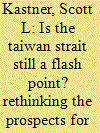

|
|
|
|
|
| Summary/Abstract |
After decades of tension, relations between the People's Republic of China and Taiwan have improved dramatically in recent years. How durable is this détente? To what degree is armed conflict in the Taiwan Strait a continued possibility? Answering these questions requires grappling with the impact of several different trends in cross–Taiwan Strait relations, including a rapidly shifting balance of military power, deepening China-Taiwan economic integration, and changing Taiwanese views on sovereignty and identity issues. Taken together, these trends help to stabilize the cross-strait relationship. Nevertheless, this relationship has not been fundamentally transformed, and future trends could evolve in a way that again increases the danger of military conflict. In particular, a changing balance of military power in the Taiwan Strait has the potential to be highly destabilizing if it overtakes other trends such as economic integration.
|
|
|
|
|
|
|
|
|
|
|
|
|
|
|
|
| 8 |
ID:
087697
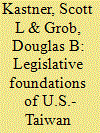

|
|
|
|
|
| Publication |
2009.
|
| Summary/Abstract |
Taiwan remains central to peace and stability in U.S.-China relations, and to prospects for democracy and prosperity in the Far East. The Taiwan Relations Act assigns to the U.S. Congress a greater role in the formulation of U.S. policy toward Taiwan than it exercises in other areas of foreign policy. Within the U.S. House of Representatives, the only organization that is explicitly supportive of a robust U.S.-Taiwan relationship is the Congressional Taiwan Caucus. Yet there exists, to our knowledge, no systematic empirical study of the correlates of Caucus membership. Few studies systematically analyze the factors that impel Members of Congress publicly to take positions that favor Taiwan. This paper addresses that gap with respect to the 109th Congress (2005-2006). We develop a method of analyzing Caucus membership and show that it yields new empirical findings about the micro-foundations of Taiwan policy making in Congress. Unlike previous studies, our unit of analysis is not the legislature, nor the legislative chamber, nor the parties within the chamber. We drill down further, collecting data at the level of the individual Member.
|
|
|
|
|
|
|
|
|
|
|
|
|
|
|
|
| 9 |
ID:
124076
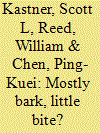

|
|
|
| 10 |
ID:
081248
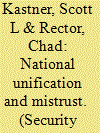

|
|
|
|
|
| Publication |
2008.
|
| Summary/Abstract |
Can states that mistrust each other as much as the Peoples' Republic of China (PRC) and Taiwan reach unification agreements? Unification agreements are most feasible when one of two conditions holds: the unification bargain does not independently erode the bargaining power of the weaker state, or the more powerful state can commit credibly not to use its increased bargaining power to restructure the agreement ex post. Our argument accounts for two historical cases-the nineteenth century Argentine and German unifications-and helps to explain why the PRC has found it difficult to make progress on achieving a peaceful bargain with Taiwan. We describe several possible future scenarios for cross-Strait relations and show that democratization in the PRC is not a necessary prerequisite for a unification agreement between the mainland and Taiwan
|
|
|
|
|
|
|
|
|
|
|
|
|
|
|
|
| 11 |
ID:
073578
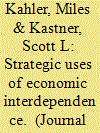

|
|
|
|
|
| Publication |
2006.
|
| Summary/Abstract |
While the determinants and effectiveness of economic sanctions have been the subject of a substantial and growing literature in international relations, much less attention has been given to economic engagement strategies, where a country deliberately expands economic ties with an adversary to change the target's behavior. This article develops a theoretical framework that distinguishes between three types of engagement strategies: conditional policies that directly link economic ties to changed behavior in the target state; unconditional policies where economic interdependence is meant to act as a constraint on the behavior of the target state; and unconditional policies where economic interdependence is meant to effect a transformation in the foreign policy goals of the target state. The article presents several hypotheses concerning the conditions facilitating or hindering the successful implementation of these different strategies, and then examines engagement policies adopted by three East Asian states: South Korea, Taiwan, and mainland China. The cases offer preliminary confirmation of at least three of the hypotheses: conditional strategies are less likely to succeed when the initiating state is a democracy; transformative strategies are more likely to succeed when the target state is a democracy; and transformative strategies are more likely to succeed when a broad consensus exists in the initiating state.
|
|
|
|
|
|
|
|
|
|
|
|
|
|
|
|
| 12 |
ID:
189498


|
|
|
|
|
| Summary/Abstract |
During the current global COVID-19 crisis Taiwan has portrayed itself as both an example for other countries to follow and as a country willing to assist others in their own efforts with the virus. Taiwan has also renewed efforts to participate in the World Health Organization (WHO), an organisation from which it is currently excluded. Although some countries have supported Taiwan's efforts to participate in the WHO or have praised its COVID-19 response, others have been silent or even critical, sometimes citing commitments to a “one China policy.” In this paper, we use newly collected data to explore cross-national variation in support for Taiwan during the current pandemic. We find that a country's level of economic development and security ties with the US are strongly correlated with support for Taiwan while a country's economic ties to China is a less consistent predictor.
|
|
|
|
|
|
|
|
|
|
|
|
|
|
|
|
| 13 |
ID:
078690
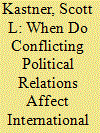

|
|
|
|
|
| Publication |
2007.
|
| Summary/Abstract |
Limited commercial integration between India and Pakistan or within much of the Middle East suggests that conflicting political interests between countries can have a detrimental effect on their economic relations. But rapidly growing economic ties between Mainland China and Taiwan show that commerce can also flourish even in the presence of very hostile relations. I explore this variation and hypothesize that the effects of international political conflict on trade are less severe in cases where internationalist economic interests have relatively strong political clout domestically. Simple quantitative tests on a sample of seventy-six countries over the years 1961 to 1992 are supportive; further evidence is provided via a brief case study of Mainland China-Taiwan relations.
|
|
|
|
|
|
|
|
|
|
|
|
|
|
|
|
|
|
|
|
|